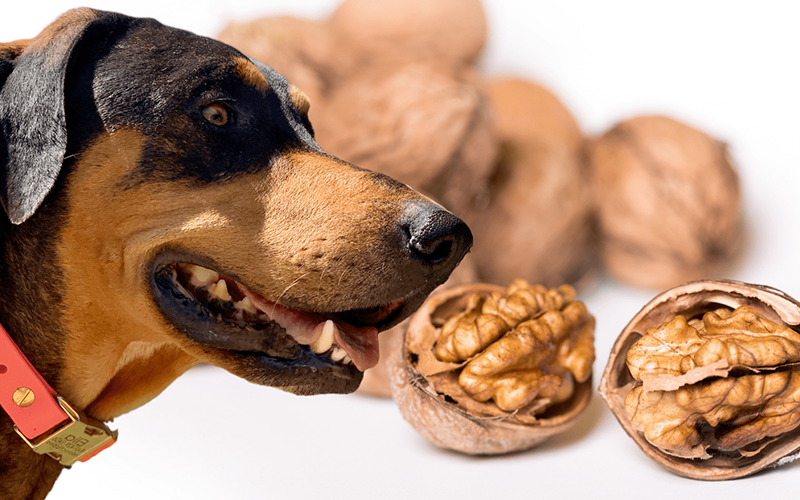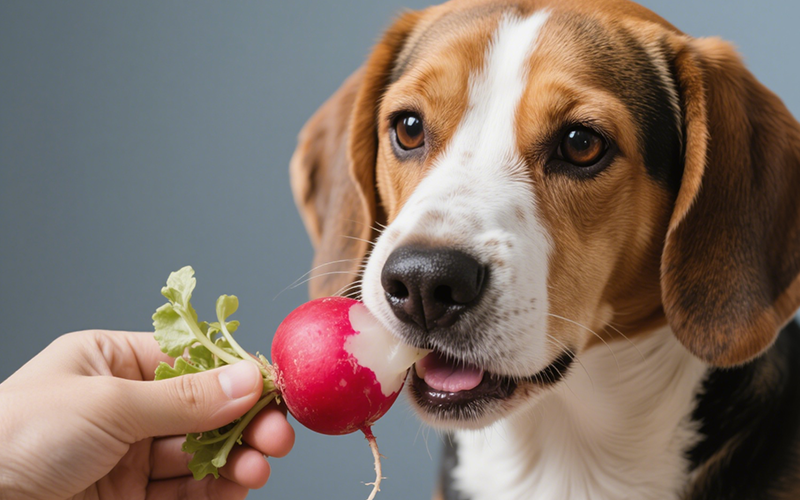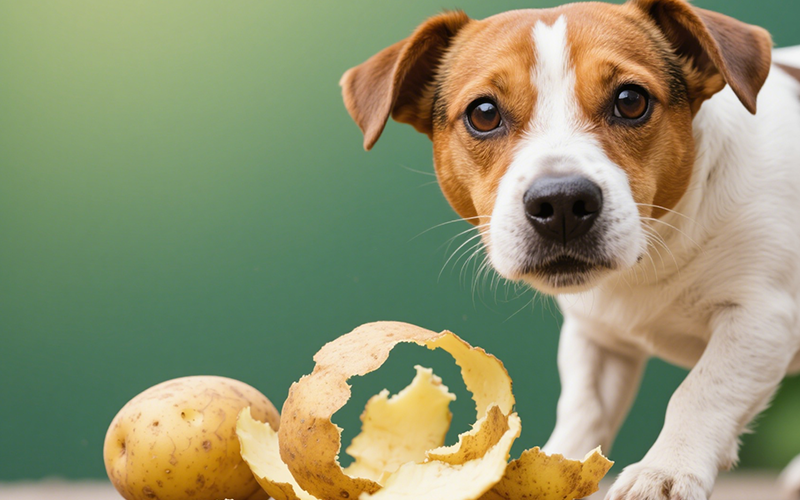Can Dogs Eat Walnuts? A Guide to Feeding Nuts to Your Dog Safely
- 24 Feb 2025 15:10
As a dog owner, you may be tempted to share your favorite snacks with your pet, but it's important to be cautious when offering certain foods. Walnuts are a type of nut that many pet owners wonder about. So, can dogs eat walnuts? The short answer is no, dogs should not eat walnuts.
In this article, we will explain why walnuts are not safe for dogs, the potential risks of feeding them, and which nuts are safer alternatives for your furry friend.

Why Walnuts Are Not Safe for Dogs
While walnuts themselves are not toxic to dogs, they pose several health risks that make them unsafe for your pet to consume. The two main concerns are:
Toxicity from Mold
Walnuts can sometimes be contaminated with a type of mold called Aspergillus, which produces toxins known as mycotoxins. These toxins can be harmful or even fatal to dogs if ingested. While fresh walnuts are less likely to contain mold, old or improperly stored walnuts can harbor these toxins. Eating moldy walnuts can cause symptoms such as vomiting, diarrhea, and seizures.Choking Hazard and Digestive Issues
Walnuts are large and can be difficult for dogs to chew, especially smaller dogs. Choking is a significant risk, particularly if the walnut is not properly broken down. Even if the walnut is chewed properly, it can cause digestive upset, including gas, bloating, and diarrhea. The high fat content of walnuts can also lead to pancreatitis in some dogs, especially if consumed in large amounts.High Fat Content
Walnuts contain a high amount of fat, which, while healthy in moderation, can cause pancreatitis in dogs if eaten in excess. Pancreatitis is an inflammation of the pancreas that can lead to serious health issues, including vomiting, abdominal pain, and lethargy. This condition can be life-threatening if not treated promptly.
Symptoms of Walnut Poisoning in Dogs
If your dog consumes walnuts, particularly moldy or large quantities, be on the lookout for the following symptoms of walnut poisoning or digestive upset:
Vomiting
Diarrhea
Lethargy
Loss of appetite
Seizures
Abdominal pain or bloating
If you notice any of these symptoms, it's important to contact your veterinarian immediately for advice and treatment.
Safer Nut Options for Dogs
If your dog enjoys nuts and you’d like to offer them a healthy alternative, there are several nuts that are generally safer than walnuts. However, it's important to remember that nuts should always be fed in moderation, as they are high in fat and can contribute to weight gain and other health issues if overfed.
Here are some safer nut options for dogs:
Peanuts
Plain unsalted peanuts are generally safe for dogs in small amounts. They are high in protein and healthy fats but should be fed without any added salt, sugar, or seasoning. Avoid feeding peanut butter that contains xylitol, a sweetener that is toxic to dogs.Cashews
Cashews are safe for dogs when served in moderation and without any added salt or flavoring. They are a good source of protein and healthy fats, but too many cashews can cause digestive upset.Almonds
Almonds can be fed to dogs in small quantities, but they should be unsalted and free of any additives. Almonds are not toxic, but they can be difficult for dogs to digest, so make sure to break them into smaller pieces to prevent choking.Pecans
Like walnuts, pecans should generally be avoided due to their high fat content and the potential for mold contamination. However, if you choose to give your dog pecans, they should be plain and given in very small amounts.
How to Safely Feed Nuts to Your Dog
If you want to feed your dog nuts, it's important to follow these guidelines to ensure safety:
Avoid Salt and Seasonings
Always offer unsalted nuts with no added seasoning or flavorings. Salt, garlic, and other spices can be harmful to dogs and should be avoided.Serve in Small Amounts
Nuts are high in fat and calories, so they should be given in moderation. Only offer small pieces of nuts as a treat, and don’t make them a regular part of your dog’s diet.Remove Shells
Never feed your dog nuts with their shells, as the shells can be a choking hazard and difficult for dogs to digest.Watch for Signs of Allergies or Sensitivities
Some dogs may have allergies or sensitivities to certain types of nuts. If you notice any adverse reactions after feeding nuts to your dog, such as itching, swelling, or gastrointestinal upset, stop feeding them nuts and consult your veterinarian.
What to Do If Your Dog Eats Walnuts
If your dog eats walnuts, particularly moldy or large quantities, take the following steps:
Monitor for Symptoms
Watch for signs of digestive upset or poisoning, including vomiting, diarrhea, lethargy, or seizures.Contact Your Veterinarian
If you suspect that your dog has eaten a significant amount of walnuts or moldy walnuts, contact your veterinarian right away. The vet may recommend treatment to prevent or manage any potential poisoning or digestive issues.Provide Fresh Water
Make sure your dog has access to fresh water to help flush any toxins from their system and prevent dehydration if they are experiencing gastrointestinal upset.
Should You Use PettureX for Your Dog’s Health?
If you have concerns about your dog’s health or dietary choices, including what types of foods are safe to feed, PettureX is a helpful tool. PettureX provides 24/7 online consultations with pet health professionals who can offer advice on feeding, health concerns, and general pet care.
Conclusion: Can Dogs Eat Walnuts?
In conclusion, walnuts should not be fed to dogs due to the risks of mold contamination, choking hazards, and the potential for pancreatitis from their high fat content. While walnuts are not toxic, the risks outweigh the benefits, and safer alternatives like peanuts, cashews, and almonds can be given in moderation.
Always remember to feed your dog nuts in small amounts, and avoid giving them walnuts. If you’re unsure about your dog’s diet or have any concerns about their health, don’t hesitate to reach out to a veterinarian or use PettureX for 24/7 pet health consultations.
Related

Radish Bites for Your Buddy? A Vet-Reviewed Guide on Whether Dogs Can Eat Radishes
- 22 Apr 2025
Potato Peels for Pooches? Unpeeling the Risks and Facts for Dog Owners
- 22 Apr 2025
Crunchy Curiosity: Can Dogs Safely Snack on Pork Rinds? A Deep Dive
- 21 Apr 2025
Pomegranate Seeds and Pooches: A Deep Dive into Whether Dogs Can Safely Indulge
- 21 Apr 2025
Can Dogs Eat Peaches? Vet Explains Benefits, Cyanide Risks & Safe Serving
- 16 Apr 2025
Can Dogs Eat Mulberries? Vet Explains Safety, Benefits & Potential Risks
- 16 Apr 2025
Can Dogs Eat Mozzarella? Vet Explains the Cheesy Truth (Risks & Benefits)
- 16 Apr 2025
Can Dogs Eat Mango Skin? Vet Explains Why It's a Risky Chew!
- 16 Apr 2025
Can Dogs Eat Maple Syrup? The Sugary Truth & Why Vets Advise Against It
- 16 Apr 2025
Can Dogs Eat Mac n Cheese? Vet Explains Why This Comfort Food Is Unsafe!
- 16 Apr 2025
